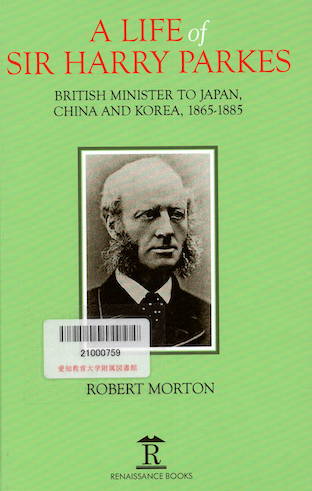Robert Morton: A Life of Sir
Harry Parkes

I had come across writings about Sir Harry Parkes in the past,
including when I read
Isabella Bird's 'Unbeaten Tracks in Japan' about her travels in
Japan, as well as in books
about past British diplomats from 'The Japan Society'. However, I
realised how little I knew
about him when I read this biography.
Although born in a reasonably well-off family, he was orphaned. As
a result his 'working'
life began early and he was in China when he was only fourteen.
That was the beginning
of a rise to the highest diplomatic posts in China and Japan and
involvement in hugely
important events which connected those countries with Britain,
particularly the Second
Opium War and the 'opening up' of Japan after the Meiji
Restoration. He learned Chinese,
which helped make him relatively indispensable and as the writer
indicates, he "always
understood what was happening in Japan far better than any other
foreign representatives
(p.264)."
He was someone of his time, seen as paternalistic in dealing with
those Asian countries and
working from a point of view of British Empire era superiority. He
was described as someone
who was tenacious (didn't give up) and could seem to be arrogant
in asserting such ideas of
superiority, especially in insisting on the higher status of Queen
Victoria when dealing with
royalty, as he did in China, Japan and Korea.
He was a workaholic, who found it difficult to relax. That
combined with the effects of tropical
disease could have led to his death at 57, although that was not
unusual for those who had
diplomatic posting in locations challenging with challenging
climates. He was not always
popular with his subordinates and offended many people he dealt
with. However, the biography
shows how he loved his wife and family, although they were often
far apart. He also involved
his wife in the work he did and she reciprocated with interest and
involvement.
Particularly in his earlier years, his life was 'exciting', with
attacks and excitement and he appeared
to show no fear! He was also ready to be 'hands on' and not 'stand
on ceremony', as shown when
he was ready to demonstrate a system to allow a bosun's (a petty
officer on a ship) chair to move
across water from one shore to another. As the writer says, "It
seems extraordinary for a man of
Parkes' rank to have submitted himself to this - a Japanese
official would not have dreamt of doing
anything like that." (p.200-201). He was, after all, Sir Harry
Parkes, successively British Minister
to Japan and British Minister to China.
It was good to discover about his life. At the time, he was
honoured with a knighthood and
after his death a memorial was unveiled in London (at St Paul's
Cathedral) and a statue in Shanghai
(melted down during World War 2), but he has faded into the past.
Therefore, this biography
does much to recognise his importance.
See other
books which I have read.
Go back.
